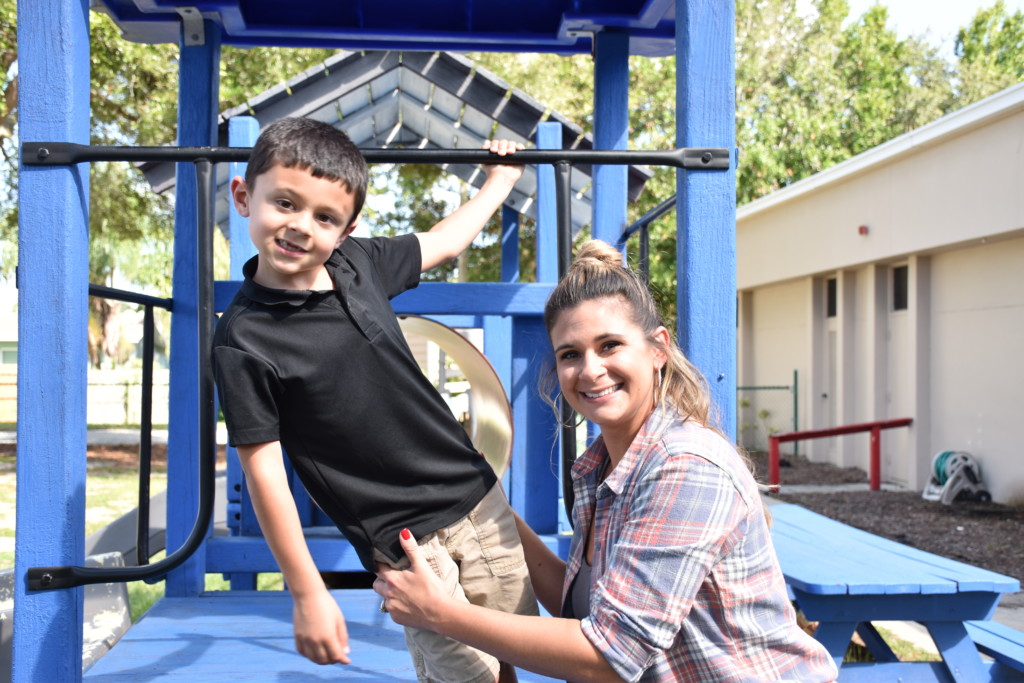
TAMPA, Fla. – Two months after her son was diagnosed with autism, Laurie Guzman felt broken and defeated, exhausted from searching for the right school.
A scholarship made her whole, if only for a short time.
Ezra was a tall, slender 4-year-old when he and his mom took a tour of LiFT Academy, a private school in Seminole that serves children with special needs.
Meeting the school’s executive director, Ezra furrowed his brow and narrowed his deep brown eyes.
“I’m a bad boy,” he stated as a matter of fact, “so I know you won’t let me come here.”
Kim Kuruzovich, equal parts caring mother and wizened educator, was stunned.
“There are no bad children,” she said, her voice raising an octave. “What are you talking about?”
“Oh, no,” Ezra said, “my teacher told me that. I’m a bad boy. That’s why I got kicked out of school.”
Kuruzovich knelt down to meet Ezra’s gaze and put her hands on his shoulders.
“You are not a bad boy,” she said. “You’re a great boy.”
She turned to Laurie and insisted Ezra enroll, if for no other reason than to learn he’s not bad.
Instantly, Laurie felt a great dam of tension burst with relief. She knew LiFT was where Ezra needed to be.
“I cried on the way home,” Laurie said. “It was heartbreaking. That was the first time I had heard him say he was a bad boy. We don’t use that in our house, so I knew where it was coming from.”
Ezra was 2 when his father, Air Force Sgt. Luis Guzman-Castillo, got orders to move to MacDill Air Force Base in Tampa. Two years later, Ezra’s explosive meltdowns had left whole classrooms trembling in his wake. Laurie was told to find a new preschool.
The diagnosis followed, but it didn’t bring clarity or relief. Instead, raw fear galloped through every synapse of Laurie’s mind as she drove home from the doctor’s office in a daze.
“I knew nothing about anything with autism,” she said. “I didn’t know what to do, where to go, nothing.”
She knew that Ezra was bright and verbal at an early age. She and Luis taught him with flash cards when he was 6 months old.
Ezra was so sweet and charming. Laurie could get lost in his eyes in one moment and then watch storm clouds gather in another.
The meltdowns were devastating. Kicking, screaming, crying, and sometimes running.
“They’re about 45 minutes,” Laurie explained, “and I’d be melting down with him by the end.”
She quit her job as a bank branch manager to stay home with Ezra and his little brother, Elijah. Laurie’s sister, who had two sons with autism back in their home state of Alabama was helpful. But there was so much to learn, it was easy to feel overwhelmed and lonely.
LiFT Academy broke the spell.
One of the tenets of the school is that parents are the experts on their children, so engagement is high. Kuruzovich, who has a daughter with autism, has an inviting way of sharing 20-plus years of experience with parents who are just learning how to navigate this world.
She told Laurie about the Gardiner Scholarship, a state program that allows families with children who have special needs to pay for therapy, tuition and other education-related services of their choice.
“The Gardiner Scholarship literally changed our lives,” Laurie said. “It made it so we are actually able to breathe. It gave me hope that my son can get help and learn like every other kid. I didn’t know that was going to be possible.”
Ezra felt more comfortable right away. He made friends. One teacher wondered if he really had autism.
Just wait, Kuruzovich said.
“When we saw it, it was pretty big,” she said of the inevitable first meltdown. “But it’s not a negative.”
That was the biggest relief to Laurie, who used to lose sleep worrying Ezra would get kicked out the next time he knocked over a desk. But at LiFT, the teachers, administrators and his therapists all know how to avoid and defuse meltdowns.
One year later, Ezra is in first grade, studying at a second-grade level. He even represented the school recently when some business people came to visit, telling them: “I love this school because I’m really safe. I can be who I am. People like me here.”
With structures in place at school and a home, everything was going well. Laurie had a plan to go back to work.
Then Luis’ new orders came. They’re moving to Alabama in January.
“Ezra is about to experience the biggest transition of his life,” Laurie said. “And he doesn’t do well with transition anyway. His school is going to change. His friends are going to change. His support is going to change. All of that keeps me up at night.”
Laurie has family in Alabama, but there is no special needs scholarship. The school she found charges $8,000 for tuition – paid up front. It’s a price tag that would make any working-class family swoon.
A proposal in the House of Representatives to create education spending accounts for some military families would have helped the Guzmans, but the House Rules Committee did not include it for a vote in May.
Rather than panicking, Laurie feels herself rising to the challenge of helping to create a scholarship in Alabama.
Now, she’s the one with marching orders.
“We were meant to come to Tampa,” she said. “We were meant to get the diagnosis. We were meant to come to LiFT. And I am meant to go to Alabama and make the difference I can make.”
“That’s my mission, to talk to people eye to eye and say what we need, what would help. I’ll say, ‘Look at a mother and a father who got a diagnosis that was completely devastating, thinking our lives were over. And they’re not.’ ”


